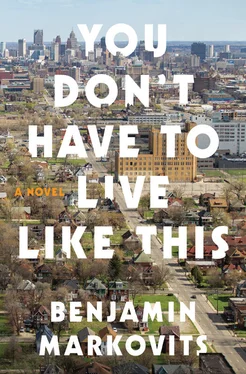“Of course they did.”
“That’s not my understanding. They had a witness system. You needed two witnesses to get a conviction.”
“I don’t think any of us wants to live in Plymouth Colony.”
“That’s not my field. What it really comes down to is money. You can talk about rights all you want, but the fact is, everything costs something, even rights, we have a limited budget, and have to figure out what to spend it on. Right now the policing in this city can’t get the job done, the tax base just isn’t there to pay for it. So we’ve come up with a cheap way to fill the gaps.”
“You could call it the Stasi app.”
“All right.”
“I’m not trying to give you a hard time. A good friend of mine pretty much lives by the E-change.”
“You mean he uses it for sex.”
“More or less.”
“The trouble is people don’t use this technology to make them happier. They use it for pleasure. Whenever you get an advance like this, the first thing it appeals to is the lowest common denominator. We have to evolve with the technology and that takes time.”
“What do you mean?”
“For example, dating services. We have at our disposal this incredible tool for arranging marriages, but people are still using it in this unbelievably basic way. Even the people who aren’t just after sex, who want committed relationships, who invest a lot of serious time in finding a partner, treat the search capacity of the Internet the way Jane Austen would. They look at education, they look at looks, they look at hobbies and interests. But we’re starting to find out so much more about people. For example, we make incredibly short-term decisions about attraction. We act like attraction is something that can only be measured in the moment, as if the window of attraction that matters is a couple of years. The number two reason for the breakdown of marriage is sexual infidelity, and the truth is, this can be predicted, this can be guarded against. We’re starting to get DNA information about the way people age, about their sex drives, that should form the basis of any serious decision about compatibility. I know from my own experience that I’m attracted to pale-skinned, black-haired women, Irish types. I also know that pale skin tends to suffer sun damage over time, that pale-skinned women who don’t take enormous care of their appearance turn either reddish or look bleached-out, and that neither of these qualities is attractive to me, that pale skin and blue eyes is a recipe for skin cancer, etc. All of this is a matter of medical record, you can look at the photographs if you want to. So I adjust my attitudes towards attraction. I know about myself that I have a moderate sex drive, probably in the bottom half of the range, somewhere in the second quartile. And we’re learning to connect sex drive to genetics and make predictions over time about, let’s say, the expected sex drive of a twenty-two-year-old woman when she reaches her fifties. But this is only one aspect of what I’m talking about.”
Tony came down and I said, “Are you ready for lunch?”
“You coming?” he said to Zwecker.
“Is Robert coming?”
“No.”
“Then I think I’ll pass. I’ve talked this guy’s ear off already.”
Outside the house I said to Tony, “Haven’t you forgotten something?”
“Oh, Jesus. Maybe we can leave him here.”
So we rang the bell again, and this time Robert answered. His shirtsleeves were rolled up to his elbows; he had bare feet.
“I forgot my son,” Tony said. “Marny and I are going out to lunch. Do you mind if I leave him here for a couple of hours?”
“This is not my department,” Robert said. “Talk to Peggy.”
Tony went into the kitchen and Robert said to me, “Come inside. The air condition’s getting out.” So we waited in the entrance hall, with the piano and the fireplace and the twenty-foot ceilings. There was a vent by my feet, and I could feel the cold air blowing up the legs of my jeans.
“We should go for a run sometime,” I said.
“I’d like to. My back isn’t great. When it feels better.”
“What’s wrong with it?”
“Nothing you can really fix. At some stage you realize, you don’t have to fix it, you don’t have to make it right, you just hope it lasts — it sees you through.”
“Well, let me know. What do you think Larry Oh’s going to say?”
“We’ll have to wait until he says it.”
“Didn’t he tell you anything at lunch?”
Robert looked genuinely surprised. “What are you talking about?”
“I thought you guys had lunch together in Ann Arbor over the weekend.”
“Who told you that?”
“I read it online somewhere. You’re like a famous man.”
“Not that famous,” he said. I tried to wait him out, but he changed the subject. “I hear your brother was in town. I’m sorry I missed him.”
“He didn’t stay long.”
“But you had a good time?”
“He’s a brother. It’s like an old marriage. A lot of familiarity, a lot of contempt, no sex.”
“Marny,” he said.
“I don’t know. I feel kind of weird, I feel a little drifty.”
“What’s going on?”
“Not much. Gloria took off for a week. She’s got some camp thing.”
“So you’re batching it. This is why you’re hanging out with Tony.”
“I guess. I don’t know how you do it, going back and forth. You’ve got to be two people, one with them and somebody else on your own.”
“You get used to it. They blend after a while.”
“That’s not what I mean,” I said. But then Tony came back, followed by Fran and Peggy and Ethan and Michael.
“Just give him a ball to kick around,” Tony said. “He’ll be happy.”
Peggy picked Michael up. He was an armful, but she swung him around on her hip, the way mothers do, and stuck out a leg. “You want to wave bye-bye to Daddy? Wave bye-bye.”
Fran asked Tony what his son liked for lunch, but then Ethan started complaining. He didn’t like seeing Mommy with another boy. So Fran scooped him up, but that didn’t help much; he squirmed and pushed against her face. Peggy kept holding Michael, who looked quietly at his father. “He’ll eat what you give him,” Tony said. “Come on, Marny, let’s get out of here. Before the shock wears off.”
“You go ahead.” There was something in the air making me sneeze, so I went to the bathroom and tore off a few sheets of toilet paper. Tony was waiting for me in the car.
“ Wave bye-bye ,” he said, when I got in. “What the fuck is that about? He’s four years old.”
“What’s Cris doing?” The leather seat felt hot on my back, where the shirt rides up.
“She’s running one of her baby yoga classes. It’s okay to take Jimmy, that’s kind of the point, but Michael gets bored. What do you want to eat? I want to eat somewhere you can have a drink.”
We ended up at the Elwood Bar & Grill, by the ballpark. The Tigers were on the road, it was midweek, so the place was pretty empty. A Wurlitzer Music sign, lit up in neon, stood over the bar. There were a bunch of TVs on the wall, showing different games, Cubs-Mets at Wrigley, Rangers-Brewers at Miller Park, but the angle was bad, I couldn’t get a good look.
“My dad used to take me here,” he said, “before it moved. It’s a different crowd now. I don’t like it much but I still come.”
Tony ordered two Bell’s Oberons, which were on tap, and a Cobb salad. I had the tuna melt. When the beer arrived, I said to him, “So what did you want to talk to Robert about? Citizen’s arrests?”
“Partly. I feel like I’m climbing out of a black hole, I’m writing again. People are taking me seriously.”
“Is that what you’re working on? Virtual policing?”
Читать дальше












